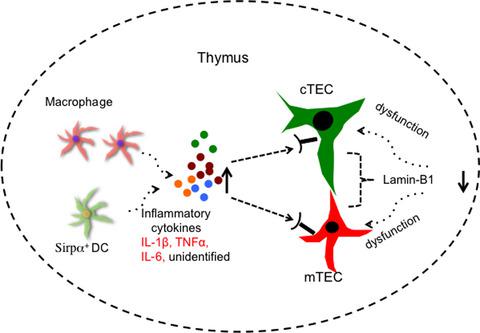当前位置:
X-MOL 学术
›
Aging Cell
›
论文详情
Our official English website, www.x-mol.net, welcomes your
feedback! (Note: you will need to create a separate account there.)
Cell-type-specific role of lamin-B1 in thymus development and its inflammation-driven reduction in thymus aging.
Aging Cell ( IF 8.0 ) Pub Date : 2019-04-09 , DOI: 10.1111/acel.12952 Sibiao Yue 1, 2 , Xiaobin Zheng 2 , Yixian Zheng 1, 2
Aging Cell ( IF 8.0 ) Pub Date : 2019-04-09 , DOI: 10.1111/acel.12952 Sibiao Yue 1, 2 , Xiaobin Zheng 2 , Yixian Zheng 1, 2
Affiliation

|
Cellular architectural proteins often participate in organ development and maintenance. Although functional decay of some of these proteins during aging is known, the cell‐type‐specific developmental role and the cause and consequence of their subsequent decay remain to be established especially in mammals. By studying lamins, the nuclear structural proteins, we demonstrate that lamin‐B1 functions specifically in the thymic epithelial cells (TECs) for proper thymus organogenesis. An up‐regulation of proinflammatory cytokines in the intra‐thymic myeloid immune cells during aging accompanies a gradual reduction of lamin‐B1 in adult TECs. We show that these cytokines can cause senescence and lamin‐B1 reduction of the young adult TECs. Lamin‐B1 supports the expression of TEC genes that can help maintain the adult TEC subtypes we identified by single‐cell RNA‐sequencing, thymic architecture, and function. Thus, structural proteins involved in organ building and maintenance can undergo inflammation‐driven decay which can in turn contribute to age‐associated organ degeneration.
中文翻译:

lamin-B1 在胸腺发育中的细胞类型特异性作用及其炎症驱动的胸腺衰老减少。
细胞结构蛋白通常参与器官的发育和维护。尽管已知其中一些蛋白质在衰老过程中的功能衰退,但细胞类型特异性的发育作用及其随后衰退的原因和后果仍有待确定,特别是在哺乳动物中。通过研究核纤层蛋白(核结构蛋白),我们证明核纤层蛋白-B1 在胸腺上皮细胞 (TEC) 中特异性发挥作用,促进正确的胸腺器官发生。衰老过程中,胸腺内髓系免疫细胞中促炎细胞因子的上调伴随着成人 TEC 中核纤层蛋白 B1 的逐渐减少。我们发现这些细胞因子可导致年轻成年 TEC 衰老和核纤层蛋白 B1 减少。 Lamin-B1 支持 TEC 基因的表达,这些基因可以帮助维持我们通过单细胞 RNA 测序、胸腺结构和功能鉴定的成体 TEC 亚型。因此,参与器官构建和维护的结构蛋白可能会经历炎症驱动的衰退,进而导致与年龄相关的器官退化。
更新日期:2019-04-09
中文翻译:

lamin-B1 在胸腺发育中的细胞类型特异性作用及其炎症驱动的胸腺衰老减少。
细胞结构蛋白通常参与器官的发育和维护。尽管已知其中一些蛋白质在衰老过程中的功能衰退,但细胞类型特异性的发育作用及其随后衰退的原因和后果仍有待确定,特别是在哺乳动物中。通过研究核纤层蛋白(核结构蛋白),我们证明核纤层蛋白-B1 在胸腺上皮细胞 (TEC) 中特异性发挥作用,促进正确的胸腺器官发生。衰老过程中,胸腺内髓系免疫细胞中促炎细胞因子的上调伴随着成人 TEC 中核纤层蛋白 B1 的逐渐减少。我们发现这些细胞因子可导致年轻成年 TEC 衰老和核纤层蛋白 B1 减少。 Lamin-B1 支持 TEC 基因的表达,这些基因可以帮助维持我们通过单细胞 RNA 测序、胸腺结构和功能鉴定的成体 TEC 亚型。因此,参与器官构建和维护的结构蛋白可能会经历炎症驱动的衰退,进而导致与年龄相关的器官退化。































 京公网安备 11010802027423号
京公网安备 11010802027423号